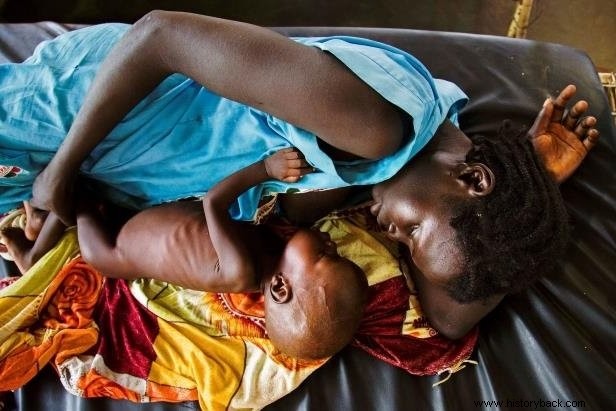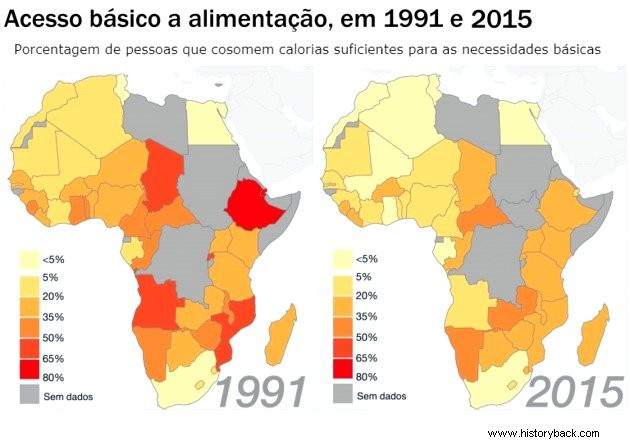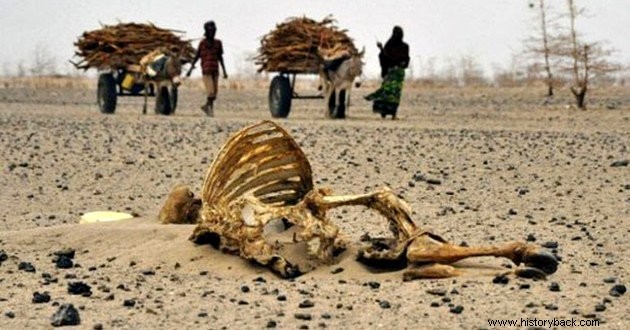The Hunger in Africa reaches at least 236 million people, according to data from FAO (the Food and Agriculture Organization of the United Nations).
Africa is the continent with the highest number of people affected by hunger.
Causes
In Africa, the lack of food results from several factors such as the colonial process, the concentration of power, climatic conditions, corruption in the authorities, low agricultural productivity, population growth, among others.

During colonization, the countries that occupied Africa removed material wealth and raw materials from the territory that could be used for the development of the region. In addition, it enslaved its people, removing the young population who were able to work.
In the process of decolonization, to gain independence, some countries had to fight for a long time against their colonizers. This was the case in Algeria and Congo, for example.
In addition, we must consider the internal conflicts of African peoples, who after independence, went into civil war.
See also:Scramble for AfricaMap of Hunger in Africa
The numbers of hunger in the African continent have registered a decrease. In the 1980s, the images of Biafra (a region of Nigeria) or Ethiopia were devastating, where the population did not have the minimum of nutrients to keep it up.
Due to the economic growth experienced in the region over the last two decades, the indices have improved as seen in the map below. However, the numbers are far from ideal.

Three out of four people born in the sub-Saharan African region are victims of hunger, according to the UN. The situation is considered severe in the so-called Horn of Africa, where the world's poorest countries are:Eritrea, Sudan, Ethiopia, Somalia, Kenya and Uganda.
Until 2008, the income per capita (per head) of an African was $1.25 a day. To understand the difference, the per capita income of an American is US$55,200 and that of a Brazilian is US$11,530, according to the World Bank.
See also:Economy of AfricaWars in Africa
A country at war does not cultivate, the tribes are constantly threatened and robbed by soldiers on both sides. In this way, farmers abandon crops, the period of food shortages begins and famine spreads.
Hunger is greater in countries at war, as they absorb the capacity to generate income and maintain the order of exploitation of the conquered.
Civil war also creates displacement of populations who have no alternative but to go to refugee camps. There are currently at least 13.5 million refugees in Africa, which represents 38% of the world's refugees.
On the move or in refugee camps, victims of violence are at the mercy of international aid. In the last three decades, African people affected by hunger have a 50% chance of being undernourished and half of the children will be out of school.
See also:Decolonization of AfricaPopulation Increase
The food crisis is also favored by population growth. Also according to the UN, in 1950, Africa was inhabited by 221 million inhabitants.
The number rose to almost 1 billion in 2009. This is explained because Africa is still an eminently rural economy and more children mean more hands to work.
Likewise, there are few programs that allow family planning. Thus, the birth rate in Africa is 5.2 births per woman over a lifetime and is the highest in the world.
To compare, in Brazil, the fertility rate is 1.8 children per woman, according to the IBGE (Brazilian Institute of Geography and Statistics).
Environmental Problems

Environmental problems also raise the issue of hunger. Today, Africa lacks solutions for the processes of erosion and desertification caused by deforestation. Areas with poor soil have lower chances of agricultural production and low performance.
African environmental issues are hampered by lack of investment and competitiveness. International organizations act on the consequences of the problem and not on the causes.
Corruption
Another decisive point for hunger in Africa is corruption, with the highest rates of countries evaluated by the NGO Transparency.
Humanitarian aid funds often end up in the hands of corrupt politicians and do not reach those who need them.
Solutions
It is the consensus of the UN, scholars, non-governmental organizations, world governments and African nations that there is no shortage of food for Africa. What is lacking is a correct management of natural resources so that everyone can be fed.
The conditions faced by African peoples result from policies of permanent exploitation. With the increase in the price of raw materials at the beginning of the 21st century, the continent showed significant growth rates and reduced infant mortality rates.
It would be necessary to take advantage of this good result, invest in education to create a virtuous cycle that would end hunger in Africa once and for all.
Read more :
- General Aspects of Africa
- Pre-Colonial Africa
- African Culture
- Hunger in the World
- Hunger in Brazil
- War in Congo
